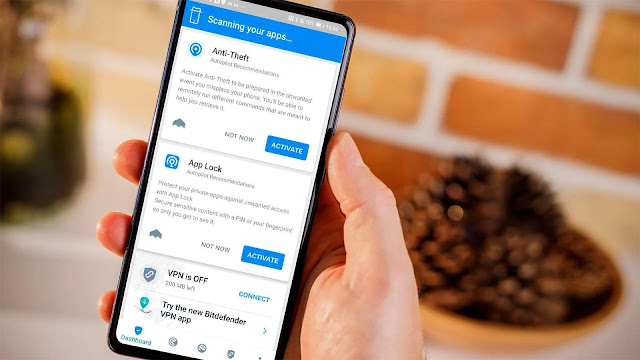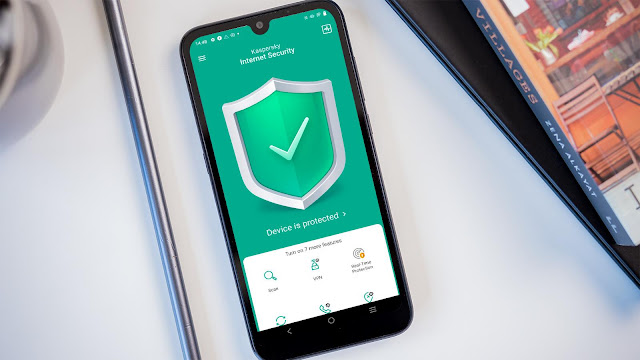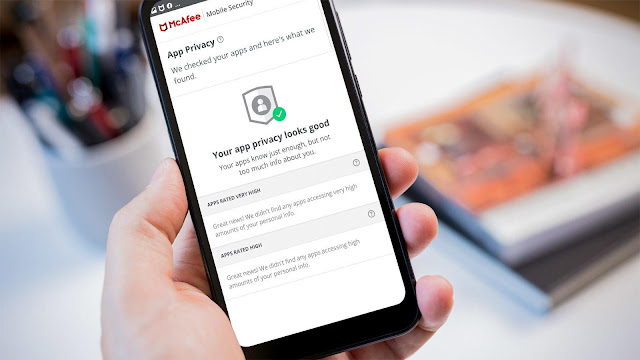Antivirus software is usually associated with Windows PCs and laptops, but it’s crucial to run it on your Android phone too.
Android is as big a target as Windows and just as vulnerable to viruses. Unlike Windows, there’s very little in the way of built-in protection. Google tries to weed out virus-ridden apps from the Play Store, but plenty slip through its net, so don’t rely on that.
And viruses aren’t simply an annoyance: cybercriminals are coming up with ever-more inventive ways to hack your devices and – ultimately – steal your identify, money and more.
The good news is that running a top-notch antivirus app on your Android phone (or tablet) will help a lot to prevent these nasties from getting anywhere near your device.
As with Windows, there’s a choice of completely free antivirus apps for Android as well as those you pay for. The same differences apply: free apps don’t include all the features you get in paid-apps.
One important difference with certain free Android antivirus apps is that some don’t offer realtime monitoring. This means they’re not constantly on the lookout for malware: you have to open the app and press the ‘scan’ button to check for any problems.
That will be a compromise too far for many, but it doesn’t apply to all free antivirus apps.
The other thing to bear in mind is that a paid subscription usually covers multiple devices, so for a few pounds or dollars per month you can install the protection on your Windows and Android devices (and, indeed, macOS and iOS). If you’re looking for this kind of protection, read our roundup of the best antivirus software.
These days, Android antivirus apps do a lot more than you might expect. They often include a VPN, warn you of possible scams, manage your passwords, prevent unauthorised apps from using your phone’s cameras and microphones, and allow you to remotely erase the device if it’s lost or stolen.
Below, you find our pick of the best antivirus apps for Android.
1. Bitdefender Mobile Security & Antivirus
- Excellent malware protection
- Lots of useful extra features
Cons
- VPN limited to 200MB/day
- Free version includes antivirus only
There are two versions of Bitdefender for Android. One is the completely free Bitdefender Antivirus app and the other is called Mobile Security & Antivirus, which isn’t free.
The former does one job only: protects your Android phone or tablet from viruses. And it does a fantastic job: in AV-Test’s most recent report from November 2021, Bitdefender caught 100% of viruses thrown at it, all without affecting the device’s performance or battery life.
That might sound great, but you get a lot more protection in the Mobile Security & Antivirus app. One of the most useful is warnings of potentially dangerous links in SMS and other messages and notifications to help you avoid being scammed.
App lock is great, too. Not only does it let you prevent access to specific apps using a PIN, but you can configure it so apps remain unlocked for 30 seconds after you close them or switch to another, or stay unlocked when your phone is on a trusted Wi-Fi network (such as your home’s).
There’s also Web Protection which warns you of websites that could be dodgy, whether you’re using Chrome, Firefox, Opera, Edge or one of a few other web browsers.
Add to that the identity protection, which alerts you if any of your email addresses are found in breaches, and some useful anti-theft features and it’s a great all-round security app.
Yes, you also get a VPN, but it’s a limited, cut-down version of Bitdefender’s full VPN service. It’s just about ok for a bit of web browsing, but you’re better off with a separate VPN app. There are a few other limitations: it doesn’t to block calls, back up data or have any parental controls, but for everything else it’s an excellent package.
If you want security for just your Android device, Bitdefender Mobile Security & Antivirus costs a very reasonable £9.99/$14.99 per year. The alternative is to buy Bitdefender Total Security which lets you install the app on up to five devices, including PCs, laptops, Macs, iPhones, iPads and Android smartphones and tablets. At the time of writing it cost £35/$44.99 for the first year, rising to £69.99/$US$89.99 after that.
2. Norton 360
- Top-notch protection
- App advisor warns of dangerous apps before installation
Cons
- No free version
Norton used to offer free Android antivirus, but no longer does. This means you’ll have to pay, but there are various options from the single-device subscription ( Norton Mobile Security) that costs £9.99/$15 (for the first year), a Norton 360 for Mobile single-device subscription for £40/$50 and Norton 360 Deluxe which protects five devices for £85/$105 per year, but discounted to £30/$35 for the first year.
And, unlike in years gone by, everything is integrated into a single app: there’s no need to run separate apps for antivirus, VPN and ID protection.
Like Bitdefender Mobile Security, it scored full marks in AV-Test’s latest report, blocking 100% of threats and having no impact on performance or battery life.
As well as malware protection you get warnings of potentially dangerous text messages, websites and Wi-Fi networks. But it’s the App Advisor which really shines, alerting you to possibly dodgy apps in the Play store before you even install them, as well as installed apps using too much data or exhibiting suspicious behaviour.
Beyond this, so long as you’re subscribed to a version of 360 and not the basic Mobile Security, you also get to use Norton’s no-limits VPN and its dark web monitoring service. All versions come with call blocking and lost or stolen device recovery.
3. Avast One Essential
- Good free version
- 5GB per week VPN
Cons
- Constant nagging to upgrade
One Essential is the latest security suite from Avast and it’s available for Windows, Mac and iOS as well as Android.
You can install and use it for free and get a lot of features without paying. But you’ll see lots of messages to ‘Go Premium’, including when ‘Advanced issues’ are found during the initial scan. In fact, these are simply features you’re not getting as a free customer, which is a bit cheeky.
The good news is that although a lot of permissions are required for everything that Avast can do, these are only requested when you try to use that feature, such as cleaning out junk files and ‘Web Shield’ which warns you of dangerous sites before you visit them.
As well as top-tier malware protection, there’s a built-in VPN that gives you a generous allowance of 5GB per week. You can’t choose a location unless you’re a paying customer, but for privacy when browsing the web or using public Wi-Fi, it’s a genuine bonus.
There’s also the option to check for any data breaches, and you can enter an email address to check even if you’re using the app without having created an Avast account.
Paying customers get notifications when their email is spotted in a data breach, but free users have to check manually.
There’s no call-blocking, no warnings about dodgy links in text messages and no anti-theft features, but if you’re just after free antivirus, One Essential is a great choice for Android users.
If you did want to upgrade to Premium, it costs £40/$50 for the first year and £80/$100 thereafter, but this covers any five devices.
4. Kaspersky Internet Security for Android
- Totally free version available
- Great protection
Cons
- Real-time protection only in paid version
- Limited VPN and password manager
Previously, Kaspersky’s Android protection was frustrating as it required four separate apps. Now, it’s more integrated: virus protection and VPN are housed under the same roof. Unfortunately, the password manager is still a separate app, and no parental controls are included. That’s a separate subscription (unless you subscribe to Total Security or Security Cloud) but it’s always a different app on Android.
Like Bitdefender, there are both paid and free versions. Only with Kaspersky, both use the same app. That means free users will see lots of prompts to upgrade to the Premium version, which is unfortunate. At least there are no third-party ads.
They’ll also miss out on the new anti-phishing feature which warns you of any dangerous links in text messages as well as real-time, automatic virus scanning, web protection and App Lock.
However, this means you’re still getting more than Bitdefender offers. Internet Security – even the free version – includes call filtering (which actually works), anti-theft, a data leak checker (a single email address for free users), a scan for weak settings, the password manager and VPN.
Both the latter are limited versions, with even paying users being able to save just 15 passwords and 300MB of data per day to use with the VPN.
Virus protection, though, is excellent. AV-Test’s November 2021 report gave it a perfect score of 18/18, though it didn’t quite manage to block 100% of attacks. It did prevent 99.9% from infecting the device compared to a 97.1% industry average, though. And remember that performance for any antivirus app varies from month to month.
To protect just one Android device with the Premium version costs £14.99/US$20 per year, but as ever, it’s cheaper to buy a license covering three, five or even more devices including Windows, macOS and iOS.
5. McAfee Security
Pros
- Good identity protection
- Great malware protection
Cons
- No free version
- Some expected features missing
McAfee used to offer a free Android antivirus app called Mobile Security. That’s been replaced by McAfee Security – which integrates the previously separate VPN.
You’ll need a subscription to use it, though. Even if you want to take advantage of the free trial, you’ll need to sign up for an account.
Of course, the core malware protection remains the same as in the old app, and it blocked 100% of malware samples in AV-Test’s most recent report. In fact, McAfee would have had a clean sheet in all tests if it hadn’t flagged a legitimate app as malware. However, that’s just a single app among the almost 1500 tested. As you’d expect, this protection works away in the background, monitoring continuously for any dangers: you don’t have to remember to run virus scans manually.
The app will scan any Wi-Fi network and tell you if it’s safe. If not – such as open public Wi-Fi – it’ll offer to enable the built-in VPN. Note that if you don’t set your Total Protection subscription to auto renew, you’ll only have 500MB of data per month for VPN use. It’s otherwise unlimited.
You can also keep track of up to 60 items of personal information such as email addresses, bank accounts, social IDs and more, and get alerts if any are ever found in data hacks. (You can enrol just 10 email addresses if you don’t have auto-renewal enabled, though).
Although McAfee can warn Windows users of so-called phishing links, that’s not available in the Android app. There’s also no call blocking, no app-locking or anti-theft features, nor protection against apps using your phone’s camera or microphones to spy on you.
If you are happy to pay for antivirus, McAfee Total Protection Premium (which costs £39.99/$49.99 for the first year) covers up to 10 devices, including Windows, Mac and iOS as well as Android.
6. Avira Free Security
- Packed with features
- Good malware protection
Cons
- Lots of upselling for free users
- Didn’t block 100% of malware
Avira is well known for offering free antivirus and Android users can still benefit from this. In fact, although you’ll have to put up with constant reminders that you’re not paying and therefore missing out on some protections, you do get a lot for free.
When you first install the app you get the option to try out the dark mode and, although it takes you straight to the Profile tap with a large Log In button, you don’t need to create an account to use Avira Security for free.
The Dashboard tab is something of a misnomer as it simply presents a Smart Scan button along with an ever-present option to upgrade to Security Pro and get a week-long trial. It does not, as you might reasonably expect from a dashboard, give you an overview of the current state of protection.
In the Security tab, there’s no antivirus to be found: you’ll see the Anti-Theft options along with Web Protection, which is locked for free users. That’s a blow, as warnings of malicious websites are a valuable feature.
Privacy features are extensive, including call blocking, ID protection, a VPN, Permissions Manager and App Lock (which uses a pattern to prevent access). ID protection lets you check if an email address has been included in any breaches but you can only get continuous monitoring (and alerts) if you create an account – fair enough. Other features such as App Lock are only usable if you create an account, too.
The password manager and microphone protection are reserved for paying users, and the VPN limits you to 100MB per day and prevents you from choosing a location.
In AV-Test’s most recent report, Avira didn’t quite block 100% of threats, managing to stop 99.6% of the 3000+ samples used, and it detected 99.9% of widespread Android malware. When others such as Avast managed 100% in both tests, you’d be forgiven for thinking Avira is best avoided. But these are still great results and far better than running no antivirus at all.
To unlock most features, Security Pro costs £6.99/$11.99 per year. That’s good value, but to get unlimited VPN use and the password manager requires an Avira Prime Mobile subscription which is £21.49/$25.99 yearly.









0 comments:
Post a Comment